Stories from the frontlines of discovery
Over 60 students, faculty, and community members gathered for an afternoon of insight, storytelling, and inspiration from women shaping the future of science and medicine for the 2025 BIO5 Inspiring Women in STEM.
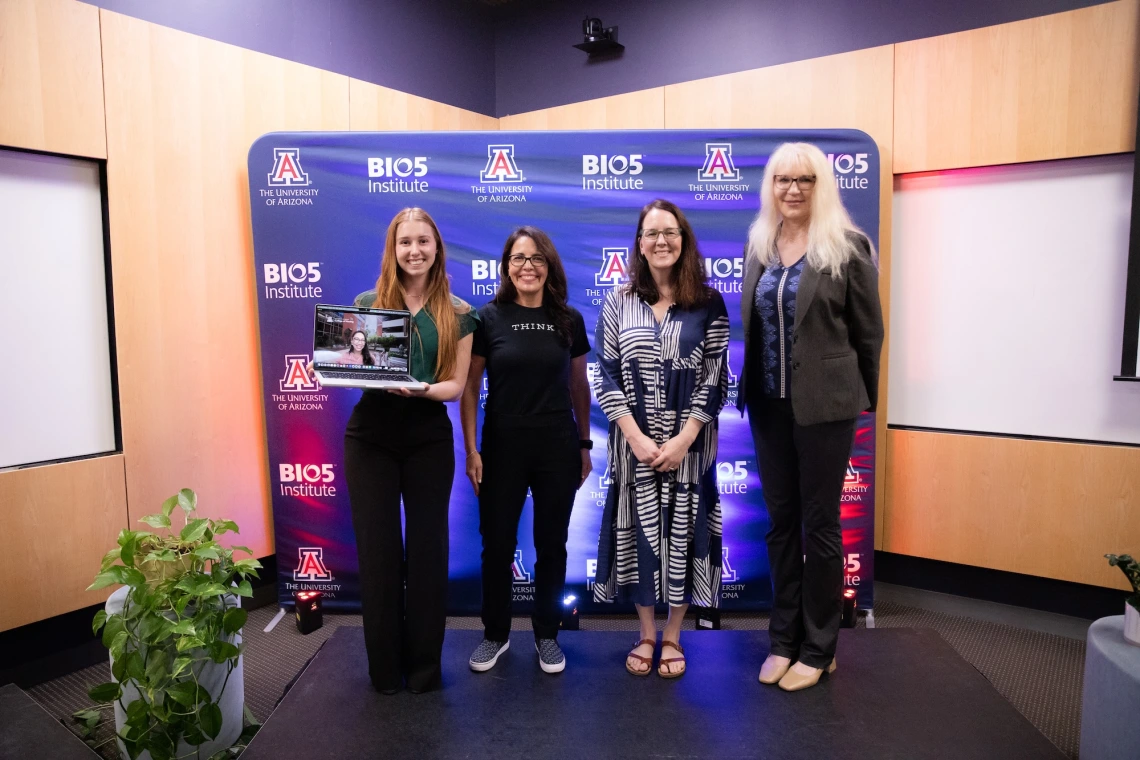
Speakers at the 2025 BIO5 Inspiring Women in STEM event, from left to right: Zhanette Coffee (via Zoom), Drew Seiser, Calline Sanchez, Kristin Huntoon, and Janine Hinton.
Lily Howe, BIO5 Institute
On July 12, 2025, the BIO5 Institute welcomed over 60 students, faculty, and community members—both virtually and in person—to the Thomas W. Keating Bioresearch Building for its eighth annual Inspiring Women in STEM event.
Open to everyone in the broader Southern Arizona community, the program spotlights the experiences of women in science, technology, engineering, and medicine.
With a keynote address, panel discussion, and one-on-one networking opportunities, the event offers attendees both practical insight and meaningful inspiration.
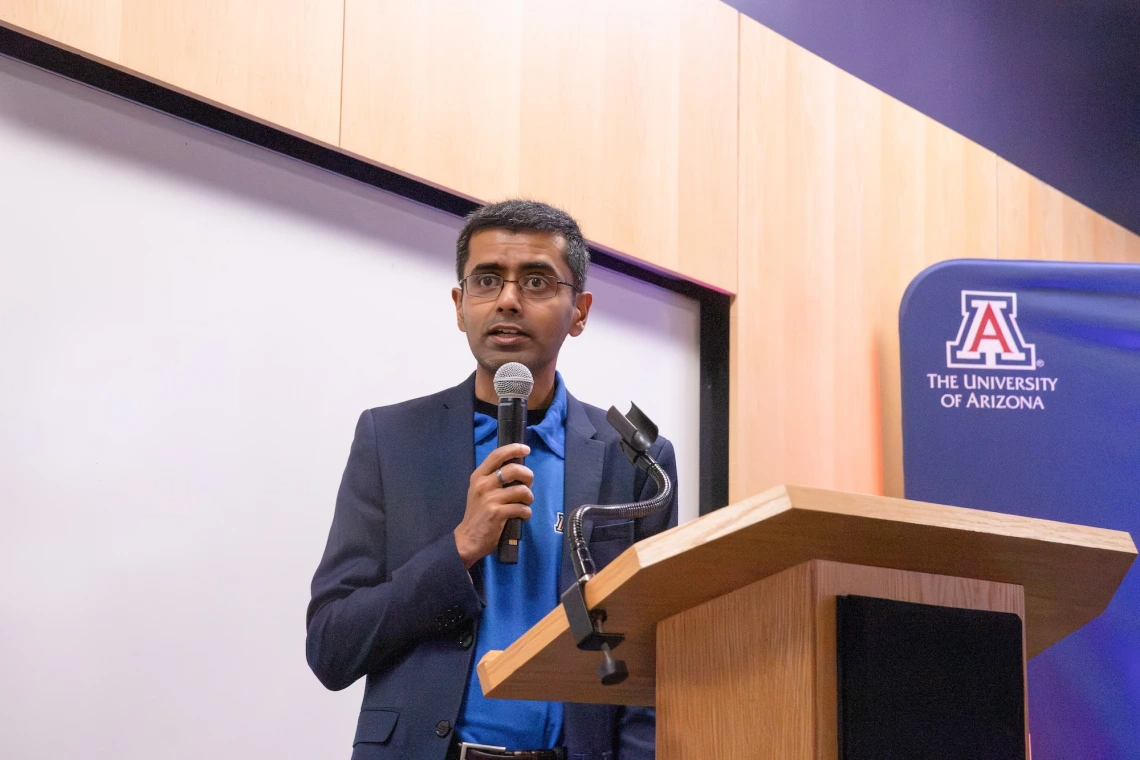
Vignesh Subbian, interim director of the BIO5 Institute, delivers the opening address during the 2025 BIO5 Inspiring Women in STEM event.
Lily Howe, BIO5 Institute
Interim director of the BIO5 Institute, Vignesh Subbian, opened the afternoon underscoring how the event reflects BIO5’s commitment to solving health challenges through collaboration.
“At BIO5, we are very deeply committed to solving health related challenges and to improving outcomes for all of us here in Arizona and beyond,” he said. “And we do that by bringing people together. By engaging teams of people, scientists, engineers, clinicians, business leaders, community experts, and our phenomenal students and trainees.”
The afternoon continued with a keynote and panel that brought to life the personal stories of growth, resilience, and discovery. Together, the speakers offered thoughtful advice and encouragement for anyone forging their own path in STEM.
Calline Sanchez: Building confidence in the company of others
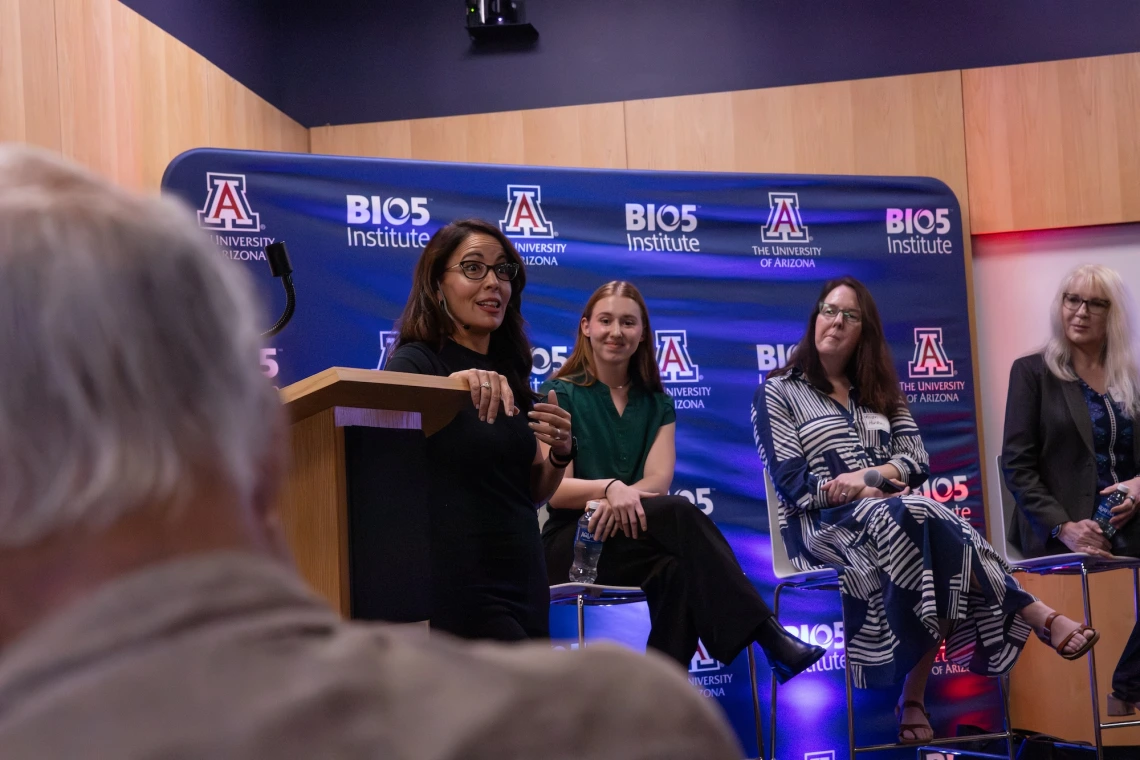
Calline Sanchez emphasizing the importance of curiosity, confidence, and collaboration to fuel progress and innovation.
Lily Howe, BIO5 Institute
Calline Sanchez began her keynote with a welcoming sense of humor.
“I started writing code when I was eight…honestly, because I didn’t really want to talk to humans,” she joked.
A University of Arizona alum and Vice President, IBM TLS Competitive Strategy, her interest in technology began not in a classroom, but at home. Small moments in her life, like learning to code on an Apple, sparked her curiosity and increased her comfort with technology.
That curiosity eventually led her to roles at national labs, leadership at IBM, and a career built on solving complex problems through innovation and teamwork.
Throughout her speech Sanchez emphasized the idea that confidence is a skill rarely built alone.
“You have to figure out how to build your own self courage, and much of that courage comes from your allies in the room.”
She closed her address by encouraging everyone to be open to new ideas and each other.
“We as humans have this fundamental curiosity to solve something, so why don’t we connect on the position of wanting to create something for the greater good.”
Drew Seiser: Every scientist has a starting point
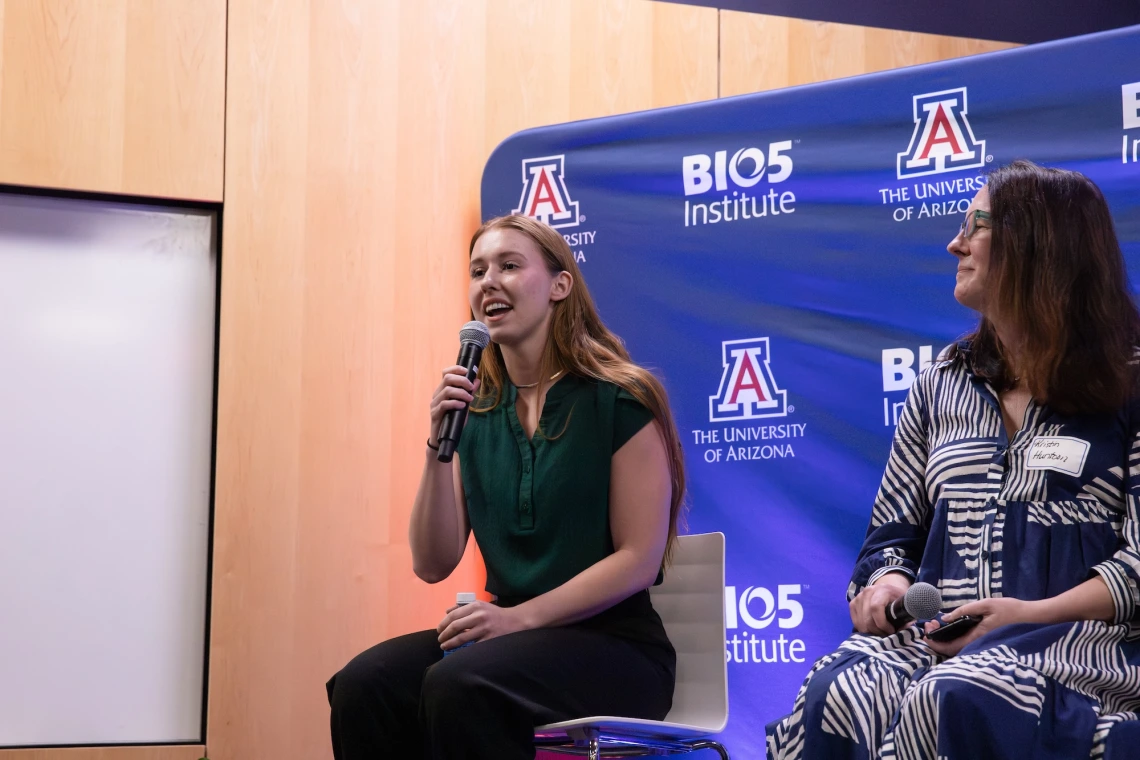
Drew Seiser discussing the importance of mentorship and perseverance in her journey towards a PhD.
Lily Howe, BIO5 Institute
Drew Seiser didn’t always picture herself in science. She began as a data science major but quickly realized it wasn’t the right fit. It was during her time in the BIO5 Ambassadors Internship that she first saw a future in science.
“The cool thing about doing that internship is that I got to go on tours and meet all sorts of researchers,” she explained.
After the internship, Seiser joined the BIO5 Institute as student staff, supporting the same internship that shaped her journey. With guidance from mentor Amy Barber, BIO5 marketing and events manager, she found a lab where she could gain research experience.
“Amy helped me reach out to people, and find my first lab,” said Seiser. “Without her help, I’m not sure I would be pursuing a PhD like I am now.”
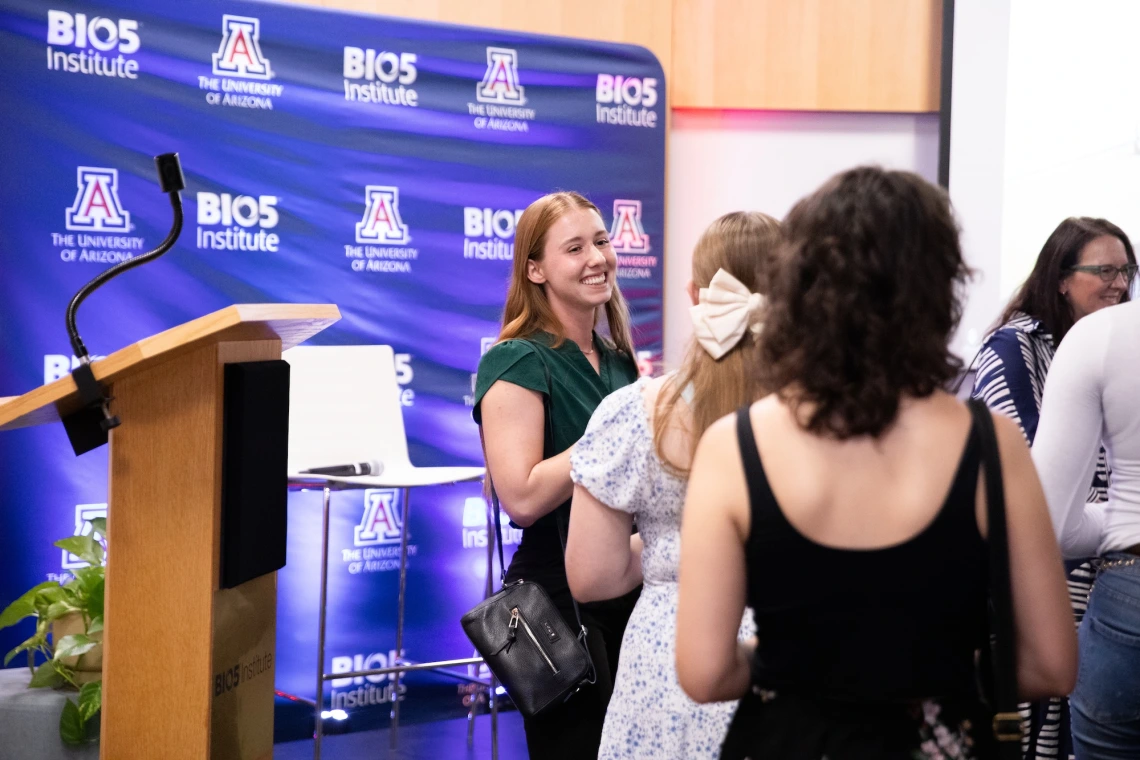
Drew Seiser answering questions and engaging with attendees.
Lily Howe, BIO5 Institute
Now preparing to begin her doctorate through the Arizona Biological and Biomedical Sciences Program at the University of Arizona, Seiser reflected on the imposter syndrome she has faced along the way
“I had to tell myself every single day that those accomplished people didn’t just wake up like that, they had to work hard and start somewhere.”
Her advice to others in a similar spot.
“Just keep going, stay curious and ask questions, and the rest will flow.”
Kristin Huntoon: Navigating neurosurgery with community as a compass
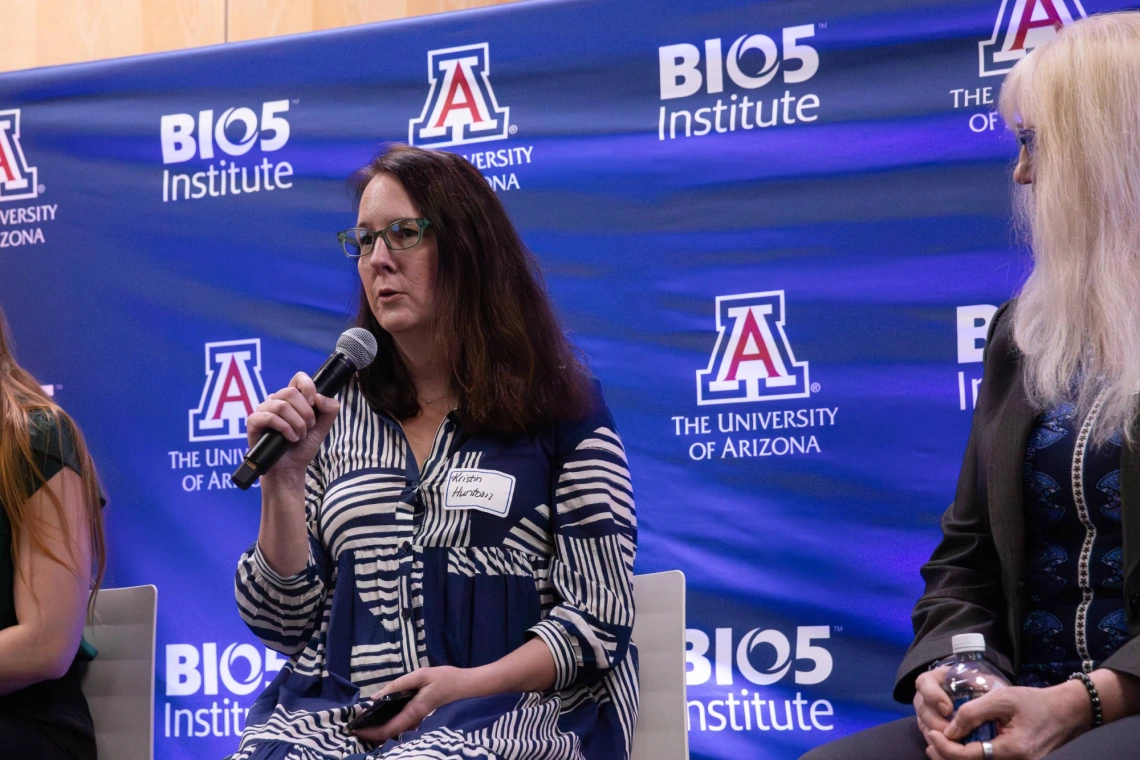
Kristin Huntoon, PhD, DO, sharing how mentorship and community helped her navigate the challenges in the field of neurosurgery.
Lily Howe, BIO5 Institute
What began as a focus on chemical engineering eventually led Kristin Huntoon through microbiology, medical school, and a seven-year neurosurgery residency.
An assistant professor at the U of A College of Medicine - Tucson and BIO5 member, Huntoon studies some of the most aggressive and under-researched brain cancers, including glioblastoma and DIPG.
While her work is rooted in cutting-edge science, Huntoon emphasized the human side of her journey as well as the struggles she has seen with underrepresentation in her field.
“I've known several female colleagues that have gone through part of neurosurgery residency and then quit,” she said. “I think not seeing someone like you can make it harder to stay motivated.”
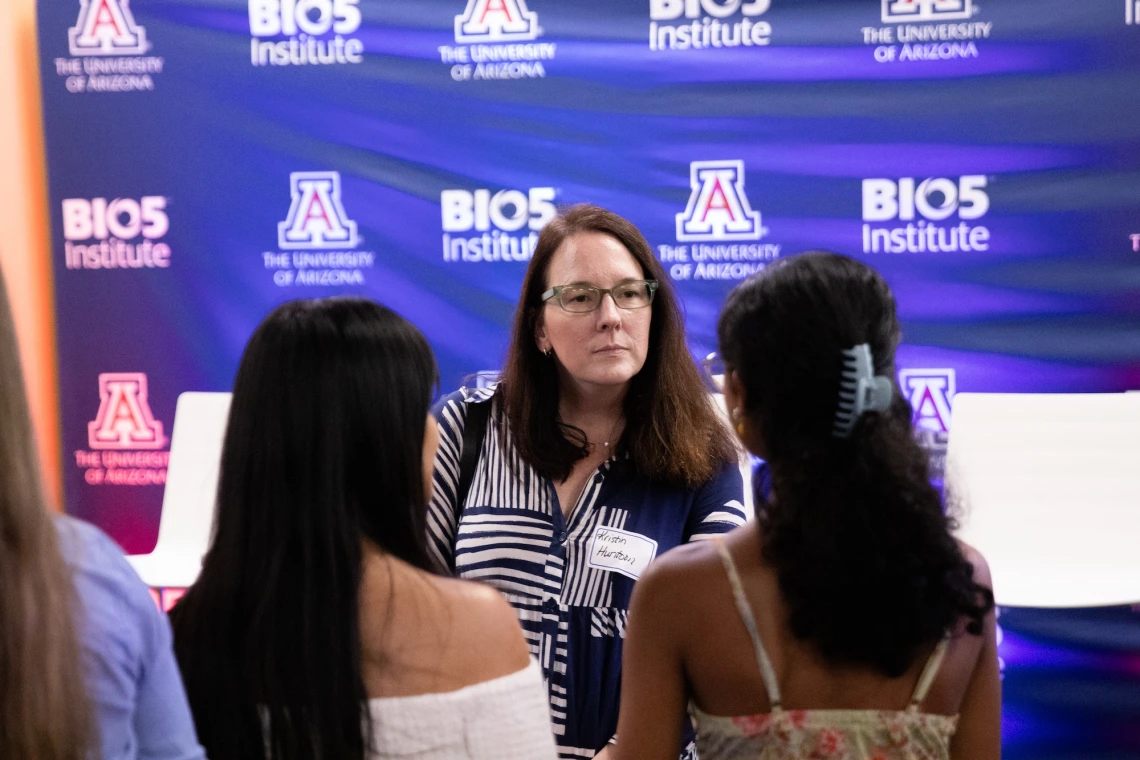
Kristin Huntoon, PhD, DO, offering advice to student attendees.
Lily Howe, BIO5 Institute
Through a women’s neurosurgery interest group, Huntoon found connection and support from others facing similar challenges. Mentorship played a key role through encouragement and accountability.
“Even if someone's being pushy and you don't always love what you're hearing, it can still be helpful,” she said.
Huntoon shared a final piece of advice for anyone interested in the field of neurosurgery.
“The days are long, but the years are short, but you just have to take everything in stride.”
Janine Hinton: Learning to lead by trusting her voice
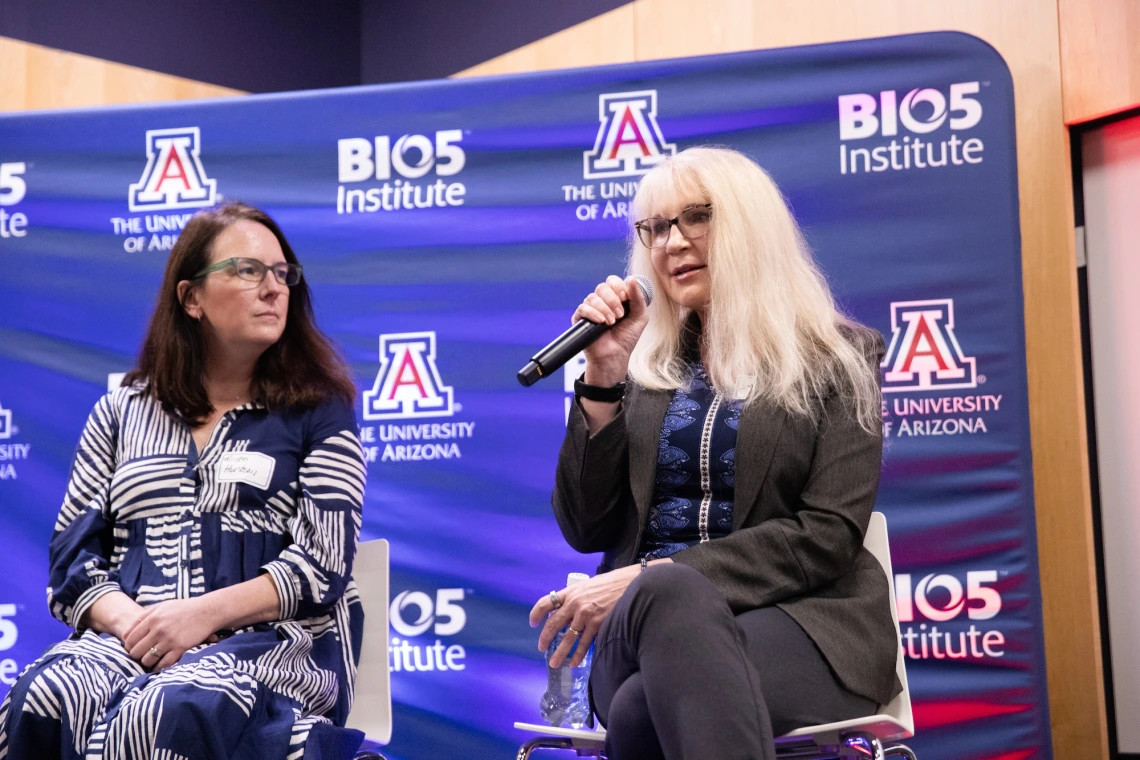
Janine Hinton, PhD, highlights how embracing individuality, while staying open to guidance, shaped her path in nursing and education.
Lily Howe, BIO5 Institute
Janine Hinton didn’t set out to become a leader, but others saw her potential before she did.
As an associate clinical professor and director of the Steele Innovative Learning Center at the U of A College of Nursing, she leads development of training environments in Tucson and Gilbert that use extended reality, biosensors, and conversational AI to prepare students for high-stakes clinical decisions.
Reflecting on her career, there were a series of turning points that were sparked by mentors who encouraged Hinton, a BIO5 member, to step into new opportunities.
“All the major crossroads and changes in my career have been inspired by someone who said, ‘hey, you know, Janine, you’d be good at this.”
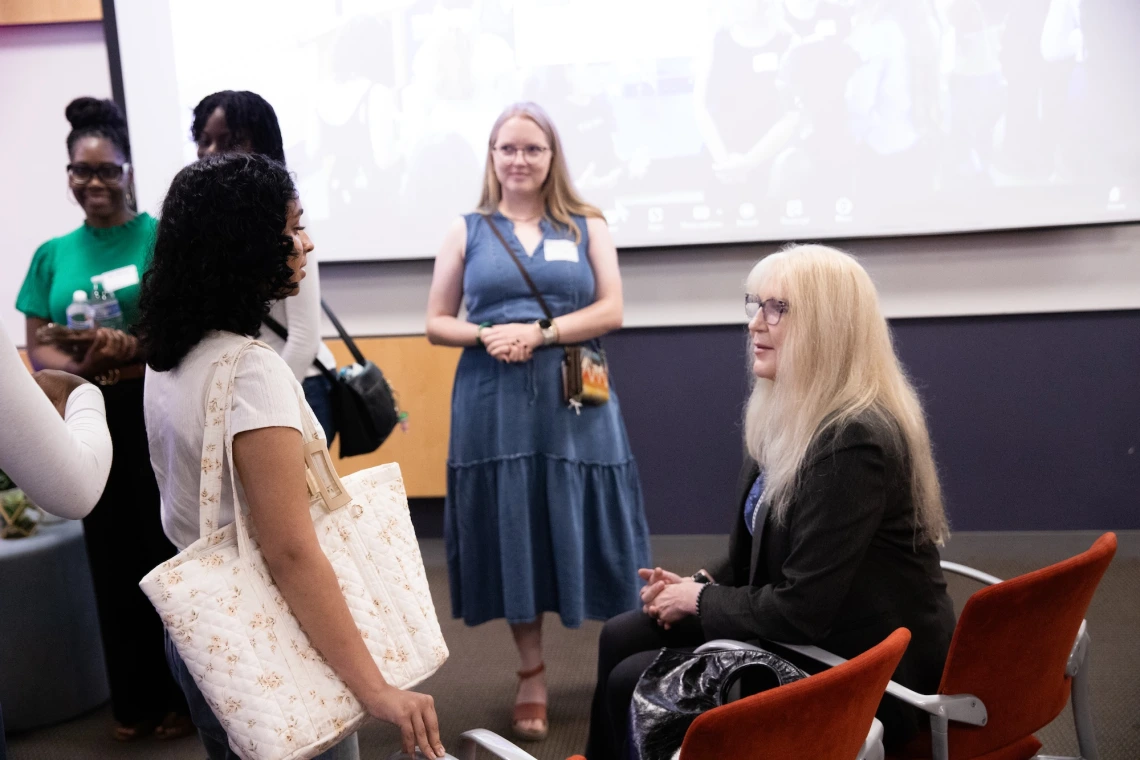
Janine Hinton, PhD, answers questions from curious event guests.
Lily Howe, BIO5 Institute
She emphasized the value of being able to receive and listen to this kind of guidance, even if it requires you rethinking the path you’re on.
“You need to be willing to accept that maybe the roads you’re running down full steam ahead might not be the best road for you.”
Her final piece of advice was a powerful reminder to continue to embrace personal individuality and make bold choices.
“Remember that you are the only you and have a unique way of viewing the world. Be the person that does the thing that’s crazy that everybody says can’t be done.”
Zhanette Coffee: Reimagining care through personal insight
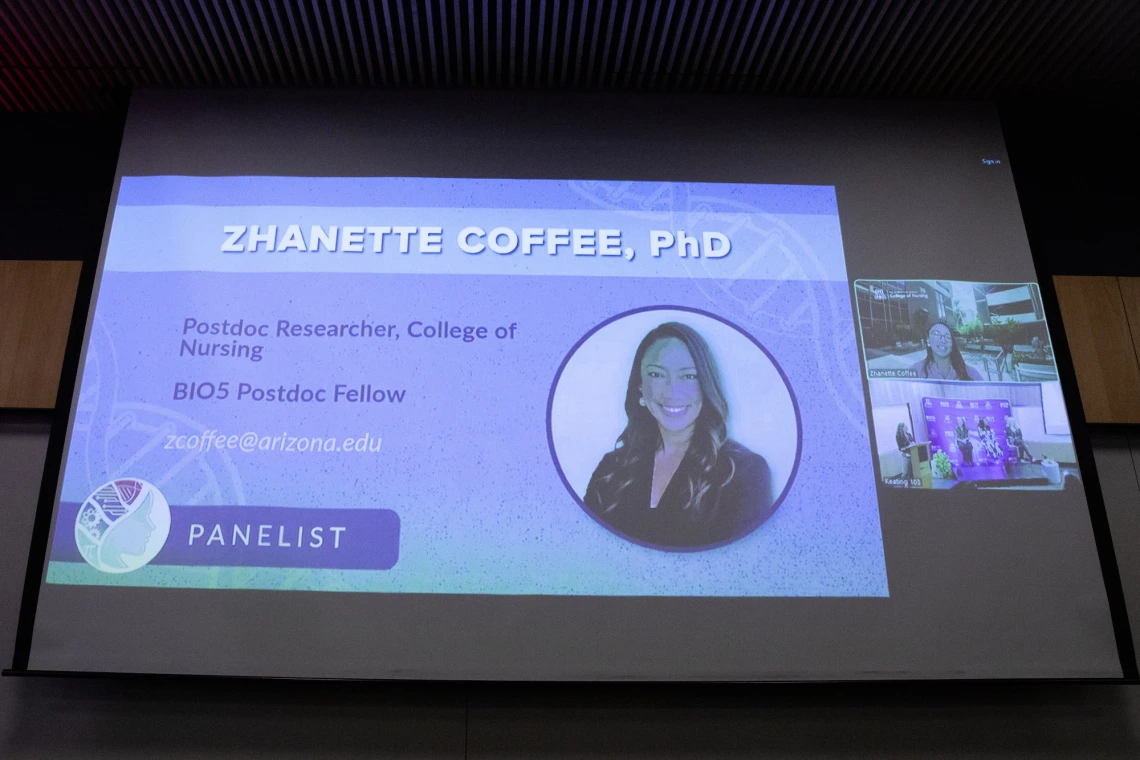
Zhanette Coffee, PhD, sharing a powerful lens into her work and advocacy of sustainable care models as an online panelist.
Lily Howe, BIO5 Institute
There’s a deeply personal connection to Zhanette Coffee’s research in addiction and pain science. A 2025 BIO5 Postdoctoral Fellow, she brings nearly a decade of nursing experience across intensive care, family practice, chronic pain, and addiction care.
Now as a postdoctoral researcher at the U of A College of Nursing working in the Harm Reduction Research Lab, her path into this field was shaped by what she experienced firsthand.
“I have lived experience of navigating the complexities of growing up with a mother that struggled with these conditions,” Coffee said. “I bring that clinical experience and lived experience, and I was able to recognize the need to address these challenges with both research and practice.”
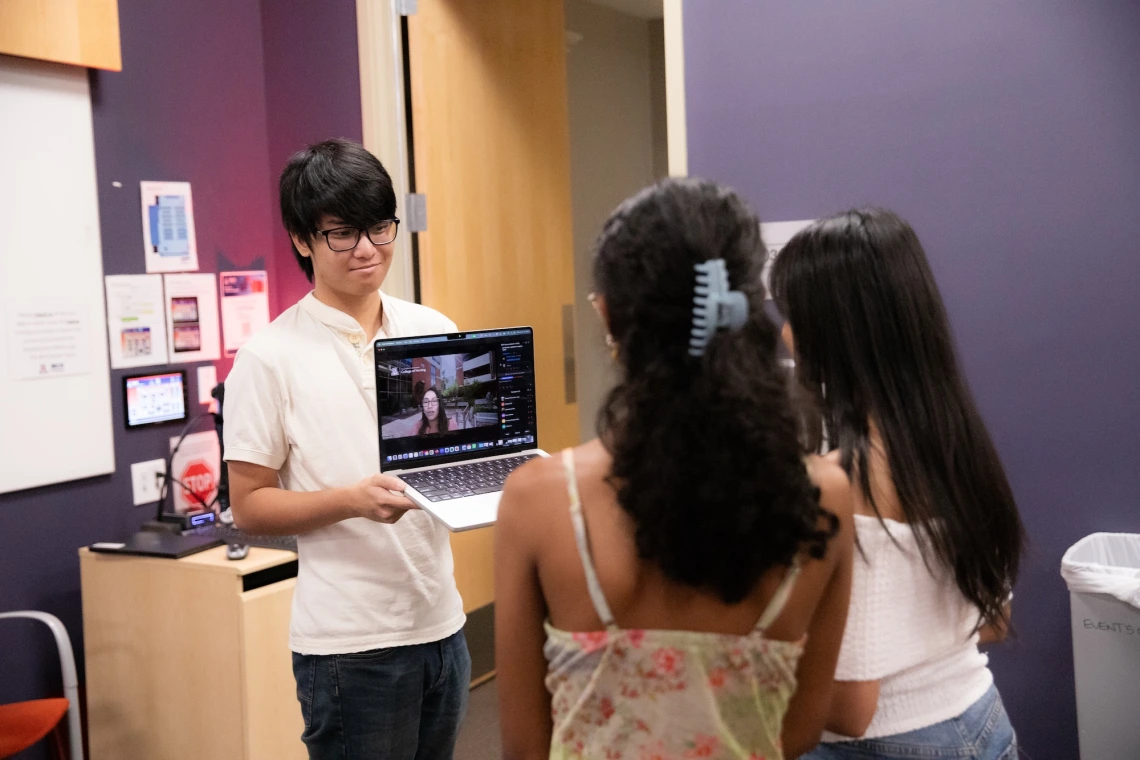
Via Zoom Zhanette Coffee, PhD, talking to students interested in pursuing a career in STEM.
Lily Howe, BIO5 Institute
Before becoming a nurse, Coffee served as a police officer. Her clinical background gave her a view into the gaps in care, both as a health provider and patient. She wants to protect healthcare providers from burning out as they develop scalable, holistic interventions to improve outcomes for patients.
After years of pushing herself in pursuit of her goals, she offered a simple piece of advice to those considering a research career.
"Balance isn’t about everything being equal all the time. It’s about knowing when to shift your focus based on what’s most important at the moment, setting boundaries, and protecting time for rest and family."
